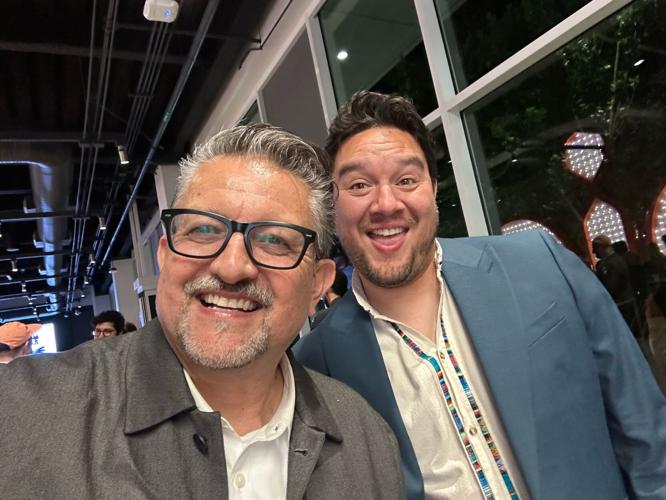
Lalo Alcaraz, left, and Miguel Puga created "The Casagrandes Movie."
The family road trip in a rattling but sturdy minivan is a rite of passage for many Latinos. That’s the experience that “The Casagrandes Movie” creators want to share in hopes that many Latinos can see themselves on screen, in animated form.
“Animation is a great place to show our cultures,” award-winning cartoonist Lalo Alcaraz said in a phone conversation. “We wanted to show a bunch of brown people,” and to show “that we’re normal,” he added.
Alcaraz co-wrote “The Casagrandes Movie” along with Rosemary Contreras, Tony Gama-Lobo and Rebecca May. He is the creator of the syndicated daily comic strip, “La Cucaracha”, published nationwide since 2002.
CALÓ News spoke to Alcaraz, Contreras and the director of the film, Miguel Puga, about their new animated movie now streaming on Netflix and about the need for more Latino representation in film. All three worked on “The Casagrandes” series before working on the full length film.
Alcaraz said animated films are in many ways “more realistic than live action films, they resonate more with people.” The lively colors in the film are indeed more faithful to real life Michoacán, the Mexican state where the main character Ronnie Anne, voiced by Izabella Alvarez, travels to with her family.
“It’s a love letter to Michoacán,” Alcaraz said.
The movie’s director Puga’s family is from Jacona, Michoacán. “I used to go down there every summer,” said the East L.A. born and raised Puga. “Going to the posadas during Christmas.”

"The Casagrandes Movie" is currently on the Top 10 most watched on Netflix in 67 countries.
He said he wanted to capture the way he saw Michoacán during his family road trips with all the vibrant colors and “share the beauty and magic that Mexico is.”
The director said he also wanted to show the rich culture of the Purépecha people, which is adding to the representation of Mexico’s indigenous people besides the Aztec or Mexica people and the Mayans.
“I hope that people see the indigenous side of Mexico is still alive, still out there and growing even more with its traditions,” Puga said.
The film is based on “The Casagrandes” cartoon series from Nickelodeon, which is itself a spin-off series of “The Loud House.”
The story in the film is about Ronnie Anne, who turns 12 years old and thinks she can spend her summer skating in the park but she is shocked to find out that her family has planned a road trip to Mexico. Once there, she faces an ancient preteen demigoddess and hijinks ensue.
The voice cast includes Paulina Chávez who starred in the Netflix series “The Expanding Universe of Ashley Garcia,” Mexican telenovela icon Angélica Aragón, “La Reina del Sur” and “Under the Same Moon” actress Kate del Castillo, Cristo Fernández from “Ted Lasso,” and more.
The film is currently on the Top 10 most watched on Netflix in 67 countries, something the creators are very excited about.
“It’s a dream come true,” Contreras said. She said that as “a little brown girl who grew up in Pacoima,” she didn’t see any movies that had a Latino family, so she is happy to be able to bring this film to life.
Contreras went to UCLA film school and has been writing for children’s animated series most of her career, including “Dora the Explorer.”
“We want to show Netflix that we do have an audience,” Contreras said. “Let’s hope that it’s the first one and that there’s many many more.”
“The Casagrandes Movie” is part of a new roster of films that slowly but surely is forging the path to increase representation in Hollywood. Still, the path is treacherous and full of obstacles, just like Ronnie Anne’s skating park from the film.

Cristo Fernández, left, and Lalo Alcaraz.
“Hollywood has not opened up the floodgates,” to Latino films, Alcaraz said. “It’s more just a trickle.”
“We have more shows but they come and go,” he continued. But even so, “we can not be denied,” he assured. “We love hollywood but we don’t get the thank you in return by seeing ourselves on the screen.”
In an effort to include more representation in the film, Puga asked Latinx in Animation co-founder Magdiela Hermida Duhamel for animation studios in Mexico to work on the film. That’s how they found Mighty Animation studio from Guadalajara, Mexico. “They were amazing people to work with,” Puga said.
The music is composed by Mexican Canadian Marcelo Trevino. “The score is fantastic, epic and very Mexican,” Puga said.
“The Casagrandes Movie” is meant to be a family film and specifically a film that Latino families can see themselves in. It is in many ways fighting the stereotypes that many Latino families face in the U.S. “We have to combat politicians that use our families as scapegoats for everything,” Alcaraz said.















(0) comments
Welcome to the discussion.
Log In
Keep it Clean. Please avoid obscene, vulgar, lewd, racist or sexually-oriented language.
PLEASE TURN OFF YOUR CAPS LOCK.
Don't Threaten. Threats of harming another person will not be tolerated.
Be Truthful. Don't knowingly lie about anyone or anything.
Be Nice. No racism, sexism or any sort of -ism that is degrading to another person.
Be Proactive. Use the 'Report' link on each comment to let us know of abusive posts.
Share with Us. We'd love to hear eyewitness accounts, the history behind an article.